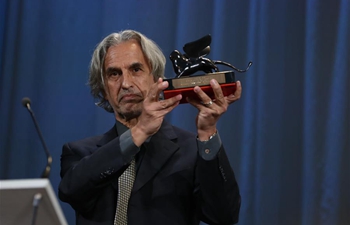by Burak Akinci
ANKARA, Sept. 8 (Xinhua) -- Recently published key economic figures indicated that Turkey's economic outlook has improved after a difficult downturn, but experts warned that the outlook is still vulnerable as the country's economy is still in trouble.
Earlier this week, Turkey's statistical authorities released a report on economic indicators of the second quarter, showing that the inflation stood at 15 percent in August, the lowest level since May.
The economy, on the other hand, has shrank by year-on-year 1.5 percent in the second quarter, representing a better performance than expected. Forecasts suggested an increase in the second half of the year.
Economists said that "the worst" period could possibly be over since a currency turmoil in the summer of 2018 which triggered a recession coupled with rising inflation and unemployment.
The downturn, which came following a decade of strong growth, also prompted much-needed foreign investors to flee Turkey. The government has for months attempted to fuel a revival of economic activities through cheap loans from state-run banks and by encouraging exports.
Upbeat by the moderately positive results, Turkish President Recep Tayyip Erdogan said Turkey is foreseeing an economic growth of 5 percent in 2020 and declining interest rates.
The government's medium-term program, announced a year ago, forecast an economic growth of 2.3 percent this year and 3.5 percent in 2020. Previous growth forecasts had stood at 5.5 percent for both 2019 and 2020.
The central bank has slashed its key interest rate by a more-than-expected 425 basis points to 19.75 percent in July to spur a recession-hit economy, after Erdogan resolutely vowed to keep interest rates at a low level.
Accused by Erdogan of failing to follow the government's policies, former Central Bank Governor Murat Cetinkaya was replaced by his deputy Murat Uysal, who later announced to cut interest rate in July.
The cut was the first step by Erdogan to contain inflation since last year's currency crisis, when the Turkish lira weakened by more than 30 percent against the U.S. dollar.
The Turkish central bank's monetary policy committee will convene next Thursday again to decide on interest rates, and a further cut is generally expected.
On the other hand, economists are cautious about the newly revealed data, pointing out that the inflation is bound to be lower year-on-year because in late 2018, it had accelerated too sharply, skyrocketing to a 15-year high of 25 percent in October 2018.
"The figures showed that Turkey's economy continued to shrink and we cannot say that it is healthy. There is still a domestic and foreign lack of confidence in its capacities," said Mustafa Sonmez, an independent economist and author, to Xinhua.
"Inflation could drop further in coming weeks but since the economy is still weak, it may rise again this year, and let's keep in mind that 15-percent inflation is very high compared with European nations, so there is no reason to be glad over these figures," he pointed out.
Turkey joins other emerging markets, as well as the U.S. Federal Reserve and the European Central Bank, in cutting rates to boost growth amid signs of a global economic slowdown.
But Sonmez said he is worried that Turkey may cut rates too quickly and be caught off guard by possible stubborn inflation in the coming months.
"A new cut in interest rates could prove risky as deposit holders would turn to foreign currency, such as euros or dollars, which are very popular in Turkey," warned the analyst who reminded that 54 percent of all bank deposits are in these two strong currencies in Turkey.
Other experts think that the poor demand is the reason of the slowdown of the inflation.
For now, slowing inflation is "a reflection of the depressing domestic demand. Firms just lack pricing power," wrote Timothy Ash of BlueBay Asset Management in a research note.
He argued that lower oil and energy prices, which come with weaker global growth, also help the Turkish government control inflation in a nation where consumers are definitely spending less since last year.

















